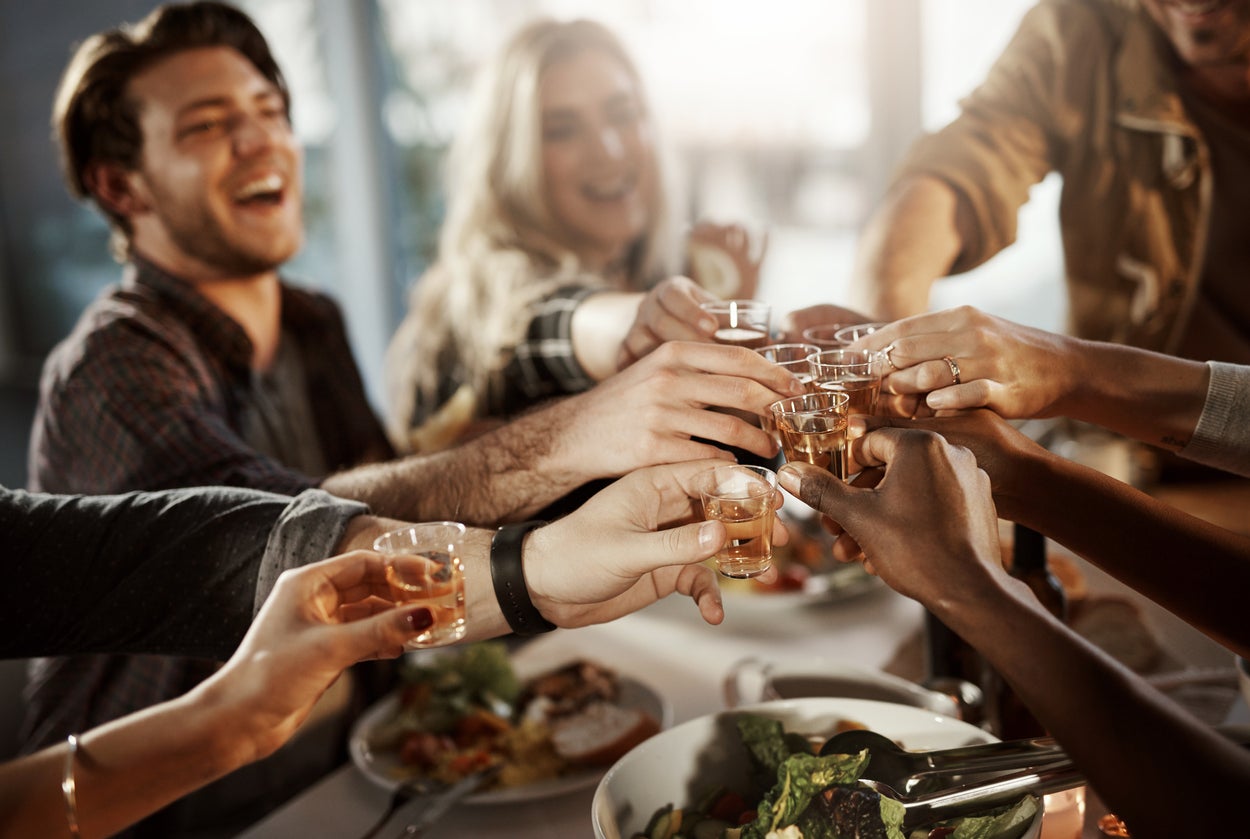Why are we so suspicious of non-drinkers in Britain?
Sober for October is a great cause, but let’s not be hypocrites – we need to stop blaming addicts for their illness and using alcohol as a marker of a good time


In my final year of infant school, the teacher instructed our class to draw a picture of the meaning of Christmas. Cue artistic renderings of the baby Jesus in a manger, glittered gifts wrapped in primary coloured ribbons, and families in party hats. Every picture was met with, “Oh! How lovely!” On reflection, I can see that my painstaking portrayal of a full pint of John Smith’s bitter complete with decorative sprigs of holly hadn’t met Miss Beeson’s brief.
She was less than impressed when it was my turn to show her my artistic imagining of the meaning of Christmas. With pursed lips, she showed my picture to the class teaching assistant. They both shook their heads and tutted. I was bewildered by the lack of approving exclamations and Miss Beeson’s disappointed tone as she told me to return to my seat.
My dad is my mate. He’s kind, he’s funny, he’s intelligent – and he’s a recovering alcoholic. When I was six, the time of Christmas pint-gate, his drinking was normal to me. I didn’t realise then that the lives of my family were structured entirely around my dad’s drinking patterns.
It’s now known as “enabling” but when I was a child – and long beyond – making sure my dad was taken to, and brought back from, the pub each evening, was about ensuring his safety as best we knew how and as best we were able. Anyone with an addict in the family knows that to love someone with a substance abuse issue is to spend most waking hours worried about where they are, what state they’re in, whether they’ll come back.
My dad went into recovery eight years ago. He’s my hero. I’ve learnt so much from him but I’ve also learnt a lot from other people’s responses to his alcoholism and recovery.
This week marks the start of Sober for October, a month-long campaign to raise money for Macmillan Cancer Support. The campaign urges us to “banish the booze” for a very worthy cause. Whenever I hear about such initiatives, I wonder how going without booze for a temporary period became such a sacrifice. I also wonder why, when plenty will happily go dry for January or proudly undertake Cancer Research UK’s Dryathlon, we continue to experience a cultural uneasiness around those who, for whatever reason, are teetotal.
Research by charity Alcohol Change UK suggests that “drinking trends in the UK change all the time” and “vary by age, gender, and where people live” but despite reported shifting drinking habits among young people in particular it’s apparent that some attitudes are more stubborn.
Given my family’s history, I know first-hand the pain of dismissive or cruel attitudes to addiction; however, there’s an added dimension during recovery of social discomfort around non-drinkers. If you’ve ever been a non-drinker on a night out then you’ll know what I mean. Unless you are willing to be “Des” and pick everyone up and drop everyone off, a teetotaller provokes a kind of strange suspicion or awkwardness.
Passive-aggressive responses to non-drinking that I’ve come across include: “Why not?”, “Oh come on! Just have one!” and “Are you sure? I’ll get you one anyway”. I’ve had “Are you pregnant?!” and “You’re no fun!” and “Well… I don’t want to drink on my own!” Worst of all is when, despite refusals, an alcoholic drink appears in front of you regardless. There’s a sense that teetotallers are Debbie-downers, ruining the party, dampening the high spirits of everyone else with their righteous, yawn-inducing alcohol-free presence.
The suspicion of non-drinkers exists incongruously alongside the dismissal and denigration of those dealing with alcohol dependence issues – as if alcoholism is a personal choice and a measure of individual morality rather than a chronic illness that requires medical treatment and compassion.
I remember the pursed lips and tutting disapproval of my infant school teacher and it seems to me that nothing much has changed. I’ve witnessed people make the same noisy expression as they pass those with substance issues on the streets. We still blame addicts for their illness and yet we still perpetuate the conceit that drinking heavily is the marker of a good time – and that being able to “take your drink” is an indication of an impressively solid character and a reassuringly robust disposition.
By all means, support Sober for October – it’s for an excellent cause – but let’s not be hypocrites with our attitudes to the drinking habits of others. Now there’s a sobering thought.
Join our commenting forum
Join thought-provoking conversations, follow other Independent readers and see their replies
Comments
Bookmark popover
Removed from bookmarks